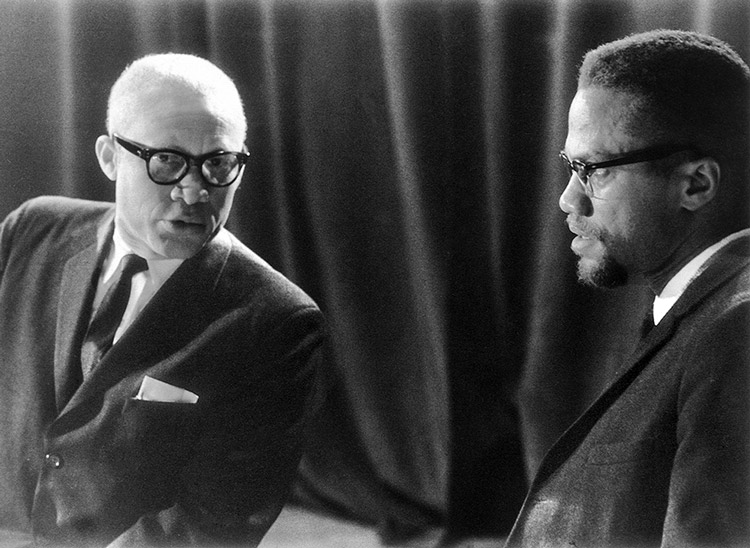For the 60th commemoration of the assassination of Malcolm X, Feb. 21, 1965, the Militant is featuring a selection from Malcolm X, Black Liberation, and the Road to Workers Power by Jack Barnes, national secretary of the Socialist Workers Party. The excerpt is from a speech by Barnes on March 28, 1987, in Atlanta, “Malcolm X: Revolutionary leader of the working class.” Barnes said his intention was to “make the case that Malcolm was a revolutionary leader of the working class in the United States.” He quotes Malcolm explaining his opposition to the twin parties of capitalism — the Democrats and Republicans. Copyright © 2009 by Pathfinder Press. Reprinted by permission.
Malcolm X — speaking and acting from within the earth’s strongest and wealthiest imperialist power, and from an oppressed nationality heavily working class in composition — was representative of this internationalization of proletarian leadership. It is not artificial to speak of Malcolm in the same breath as of V.I. Lenin, of Leon Trotsky, of Fidel Castro and Che Guevara, of Maurice Bishop, of Thomas Sankara, of leaders of the communist movement in the United States such as James P. Cannon and Farrell Dobbs. To do so registers something real. Not because we want it to, but because that’s what the course of the world class struggle has shown. Other revolutionary leaders, from Nicaragua to South Africa, are being put to the same test — and many more will be, all over the world.
Malcolm correctly insisted that the struggle for Black freedom in the United States is part of an international struggle, a struggle for human rights not just civil rights. He refused to look at America through American eyes, or to look at the world through American eyes. He took his stand from within the oppressed and exploited in the battle for liberation the world over. That was his starting point. And that’s the beginning of wisdom for any revolutionary today.
Malcolm rejected any notion that the oppressed could rely on some common humanity shared with the oppressors, or with a “well-meaning” section of the oppressors. There is no latent supply of love in the “soul” of all human beings, regardless of class, that can be tapped if they’re shamed or pressured — or lobbied or voted for. There is no abstract, classless “humanity”; there is only human solidarity conquered in struggle as a social product of class solidarity, of solidarity in political action among the exploited and oppressed worldwide. The job of revolutionists is not to act “responsibly,” which in class-divided society can only mean “responsibly” toward the rulers, or at least the bourgeois liberals and bourgeois socialists among them. What revolutionists are responsible for is to advance along the line of march toward power of the toilers, who compose the great majority of humanity.
Don’t “run around … trying to make friends with somebody who’s depriving you of your rights,” Malcolm urged the Mississippi youth I mentioned earlier. “They’re not your friends. No, they’re your enemies. Treat them like that and fight them, and you’ll get your freedom.”
That’s why Malcolm was an intransigent opponent of the Democratic and Republican parties, an opponent of the two-party system (with its occasional third-party eruptions to blow off steam) that has tied working people to capitalist politics since well before the rise of U.S. imperialism at the close of the nineteenth century. During Malcolm’s final year, the 1964 U.S. elections were in full swing, with the incumbent president, Democrat Lyndon Baines Johnson, being challenged by Republican Barry Goldwater. With the exception of the Socialist Workers Party — and Malcolm X — virtually every political current in U.S. politics claiming to speak and act on behalf of working people and the oppressed were going all out to defeat Goldwater. This was necessary to advance the fight for “peace” in Vietnam, they claimed. Some even warned of the triumph of “fascism” if Goldwater were elected. The Communist Party USA was leading the pack.
Of course, as we now know, the “peace candidate” Johnson, who was elected in November, went on to escalate the Vietnam War, raising U.S. troop levels more than thirty-fold from some 16,000 to 537,000 by the end of his term in January 1969 and initiating a murderous and sustained campaign of bombing and chemical warfare.
In July 1964, while in Africa, Malcolm learned that following a civil rights “summit meeting” in New York City, Martin Luther King and leaders of other organizations had called for a halt to demonstrations for Black freedom until after the November elections. In a statement reported in the New York Daily News and elsewhere, Malcolm commented that they had “sold themselves out and become campaign managers in the Negro community for Lyndon B. Johnson.” Exactly.
Commenting a few months later on Johnson’s re-election, Malcolm told a November 1964 meeting in Paris on his return trip from Africa that the U.S. capitalists “knew that the only way people would run toward the fox would be if you showed them a wolf. … [They] had the whole world — including people who call themselves Marxists” (a reference to the CPUSA) “— hoping that Johnson would beat Goldwater.” Malcolm continued: “Those who claim to be enemies of the system were on their hands and knees waiting for Johnson to get elected — because he is supposed to be a man of peace. And at that moment he had troops invading the Congo and South Vietnam!”
And in early 1965, when the Johnson administration began floating trial balloons about appointing a Black to his cabinet, Malcolm told the audience at a Militant Labor Forum in New York City, “Yes they have a new gimmick every year. They’re going to take one of their boys, black boys, and put him in the cabinet, so he can walk around Washington with a cigar — fire on one end and fool on the other.”


